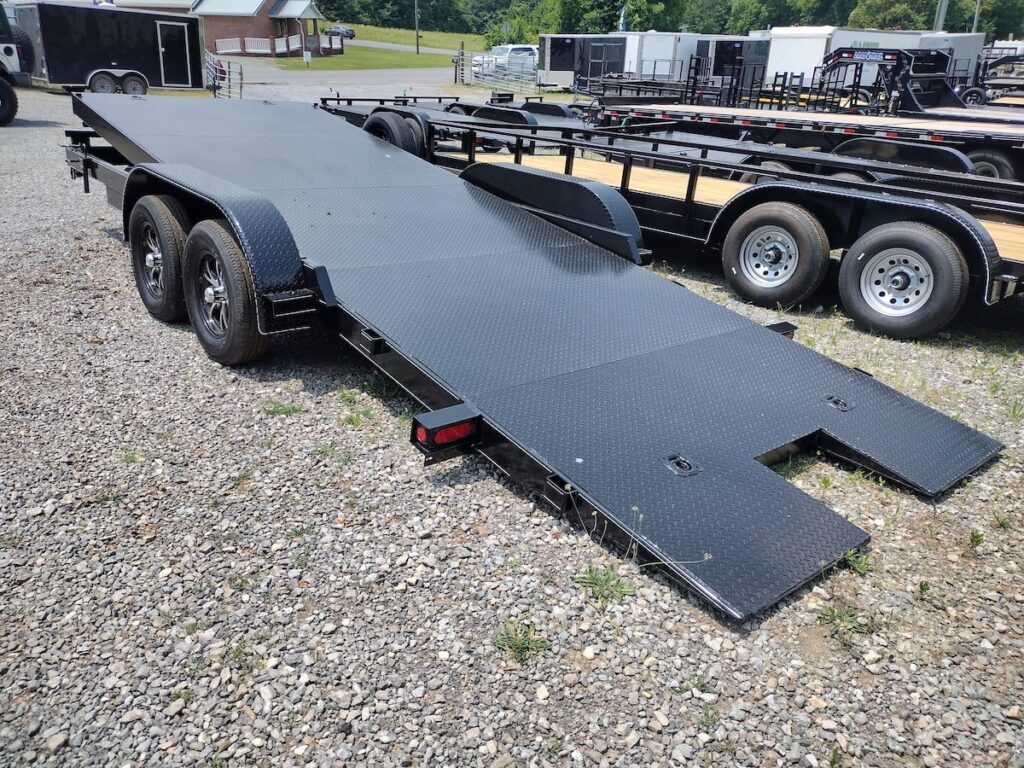Car trailers (also known as “car haulers”) are essential for safely transporting vehicles—whether for recreational purposes, car shows or even commercial use. Selecting the appropriate trailer length is crucial to ensure a secure and efficient transport process. In this guide, we’ll explore the factors to consider when choosing a car trailer length and provide recommendations for popular vehicle types.
How Much Do Car Trailers Cost?
View our chart of new and used car trailers average costs below.
| Trailer Length | Approximate Cost (USD) |
| 16 feet | $3,000 – $5,000 |
| 18 feet | $2,500 – $4,000 |
| 20 feet | $3,000 – $8,000 |
| 22 feet | $3,500 – $10,000 |
| 24 feet | $4,000 – $7,000 |
| 26 feet | $4,500 – $8,000 |
| 28 feet | $5,000 – $9,000 |
| 30 feet | $5,500 – $10,000 |
| 32 feet | $6,000 – $17,000 |
Actual prices may vary depending on age, length and materials of the trailers. Call us or visit us at one of our four locations for more information on our car trailers.
Factors to Consider When Shopping For Car Trailers:
Vehicle Size and Weight:
Consider the dimensions and weight of the vehicle(s) you’ll be transporting. Larger and heavier vehicles will require a commensurately longer and sturdier trailer to accommodate them safely.
Trailer Maneuverability:
Longer trailers provide more deck space but may be more challenging to maneuver—especially in tight spaces or when reversing. Consider your towing experience and comfort level with handling longer trailers.
We have an article with instructions on how to safely back up a trailer.
Storage and Parking Space:
Determine if you have adequate storage space for a longer trailer when not in use. Consider the length of your driveway, garage or storage facility when selecting a trailer size.
Legal Requirements:
Check local regulations and laws regarding trailer length restrictions for towing on public roads. Some jurisdictions may have maximum trailer length limits you need to adhere to.
Recommended Trailer Lengths for Popular Vehicles:
Trailer Length For Compact Cars (e.g., Toyota Corolla, Honda Civic):
A trailer length of 16 to 18 feet is typically suitable for transporting compact cars. This size provides enough deck space while maintaining maneuverability.
Shop trailers for hauling compact cars here.
Trailer Length For Midsize Sedans and Coups (e.g., Chevy Camaro, Ford Mustang, Dodge Hellcat, Nissan GTR):
For midsize sedans, a trailer length of 18 to 20 feet is recommended. This allows for comfortable loading and secure transportation without excessive overhang.
Shop trailers for midsize sedans and coups here.
Trailer Length For Full-Size Sedans (e.g., Ford Taurus, Chevrolet Impala, Dodge Charger):
Full-size sedans may require a slightly longer trailer, ranging from 20 to 22 feet. This ensures adequate space for loading larger vehicles while maintaining stability during transport.
Shop trailers for full size sedans here.
Trailer Length For SUVs and Crossovers (e.g., Jeep Grand Cherokee, Ford Explorer, Dodge Durango, Toyota RAV4, Honda CR-V):
SUVs and crossovers typically require trailers ranging from 18 to 20 feet in length. This accommodates their larger size and weight while remaining manageable for towing.
Shop trailers for SUVs and Crossovers here.
Trailer Length For Pickup Trucks (e.g., Ford F-150, Chevrolet Silverado, Dodge Ram):
Pickup trucks may vary significantly in size, so trailer length recommendations can vary. However, a range of 20 to 24 feet is generally suitable for transporting most pickup truck models.
Shop trailers for pickup trucks here.
Conclusion:
Choosing the right length for your car trailer is essential for safe and efficient vehicle transport. Consider factors such as vehicle size, towing experience, storage space and legal requirements when selecting a trailer length. By following these guidelines and recommendations, you can ensure a smooth and secure towing experience for your vehicles.





